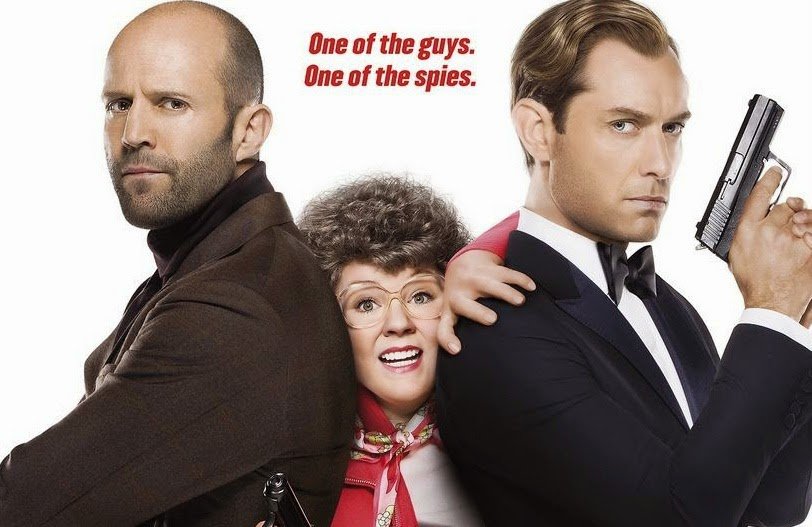Review: ‘Spy’ a winning feminist comedy

Until his hit comedy Bridesmaids in 2011, director Paul Feig enjoyed limited success. He was acclaimed by fans as the creator of cult show Freaks and Geeks, but received little mainstream attention. An obvious creative dilettante, he dabbled in hit shows such as The Office, Arrested Development and Parks and Recreation, directing one or two episodes before moving on again.
In a fascinating Guardian interview in 2013 he revealed his “feminised” personality, as he discussed how he was raised with mainly female friends and neighbours. In this context, his first major success with Bridesmaids becomes even more interesting. Many critics said basing a Hollywood comedy around an all-female cast was a risky move. In the action and comedy genres, Hollywood consistently relies on male protagonists to create rapport with audiences. Be they lovable, socially awkward geeks or brawny, trigger-happy, macho men, it seems the likeability of male characters can be exploited easily. Women are often considered divisive, abrasive or weak; better relegated to supporting roles where they can’t do much damage.

Enter Paul Feig. He turns the whole comedy genre on its head by trusting his female leads to carry the comedy themselves in Bridesmaids. The result; massive success.
Paul Feig is a feminist’s dream. Despite his Guardian interviewer dubbing him “Hollywood’s accidental feminist”, the fact is that Paul Feig is not only making successful, feminist Hollywood movies; he knows he’s doing it.
Spy is the next instalment in what will hopefully be a long line of feminist-friendly Feig masterpieces. Melissa McCarthy does not simply carry the comedy; she slays it. The film is a laugh-a-minute rollercoaster. Literal, not proverbial, screams of laughter obscured whole segments of the dialogue in the movie theatre. It delivers knee-slapping, breathless moments of hilarity, but what’s most impressive is that the comedy is sustained. Scene after scene, the audience was left doubled over with renewed waves of mirth. Melissa McCarthy is a comedy powerhouse, but with this film, she proved she’s got stamina too.
Refreshingly, the most memorable supporting actors are all female. The addition of Miranda Hart was an unexpected stroke of genius. Despite her BBC sitcom beginnings, she takes to the blockbuster role like a (very goofy) duck to water. From the opposite end of the spectrum, Rose Byrne too surprised with her effortless transition from more serious roles into a parody of her own aloof beauty. Her deadpan delivery of certain one-liners had us rolling in the aisles. Paul Feig’s risk-taking has paid off again. His work has finally given female comedians the platform they deserve, proving that women are, in fact, funnier than men.

The question any self-respecting feminist must be asking at this point is; can Feig really have succeeded in executing the perfect comedy without succumbing to misogynistic stereotyping? The answer is; almost. For the Hollywood action-comedy genre, almost is pretty darn good.
There are cringe-worthy moments; certain instances of groping are simply laughed off, Rose Byrne’s character teeters on the edge of offensive stereotype… but, remarkably, Feig for the most part manages to do the female characters justice, while parodying the braindead macho men we normally see at the helm of action films.
Melissa’s big frame meant that the possibility of her being the butt of the joke throughout the film was very real, and would have been expected under another director. Luckily, Paul Feig doesn’t let us down. Rather than shy away from action sequences, he well and truly let rip. Melissa breaks necks, turns baddies upside down and delivers head shot after head shot with unquestioned skill. While she is portrayed as self-deprecating, it’s made clear that this self-doubt comes from an oppressive, patriarchal environment rather than her own ineptitude.
Her relationships with the other women in the film are not competitive or based around men, as is so prevalent in Hollywood characterisation, but are full of nuance, mutual respect and good humour.
The female body escapes all objectification; again, an amazing feat for any film passing through the Hollywood filters. Perhaps the most shocking moment of the whole movie was when the audience was treated to two, close-up shots of one male character’s penis. At that moment, it truly felt like Paul Feig was winking at the viewer through the screen as if to say “Yup, I know exactly what I’m doing”.
With Spy, Feig has truly outdone himself. He has done the impossible by subverting misogynistic Hollywood tropes, delivering fully realised female characters, reversing sexualisation of female bodies, parodying brawny male protagonists; and still managing to deliver a laugh-a-minute comedy blockbuster.
We can only hope that Feig continues his pseudo-franchise of feminist comedies, and that other writers will take up his mantle in the future.
